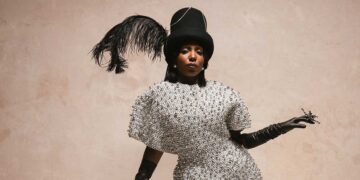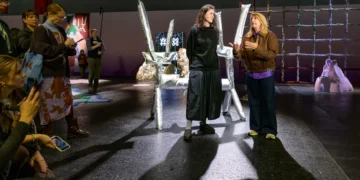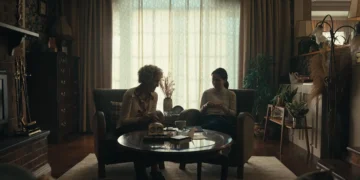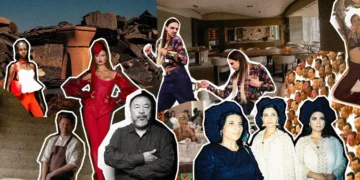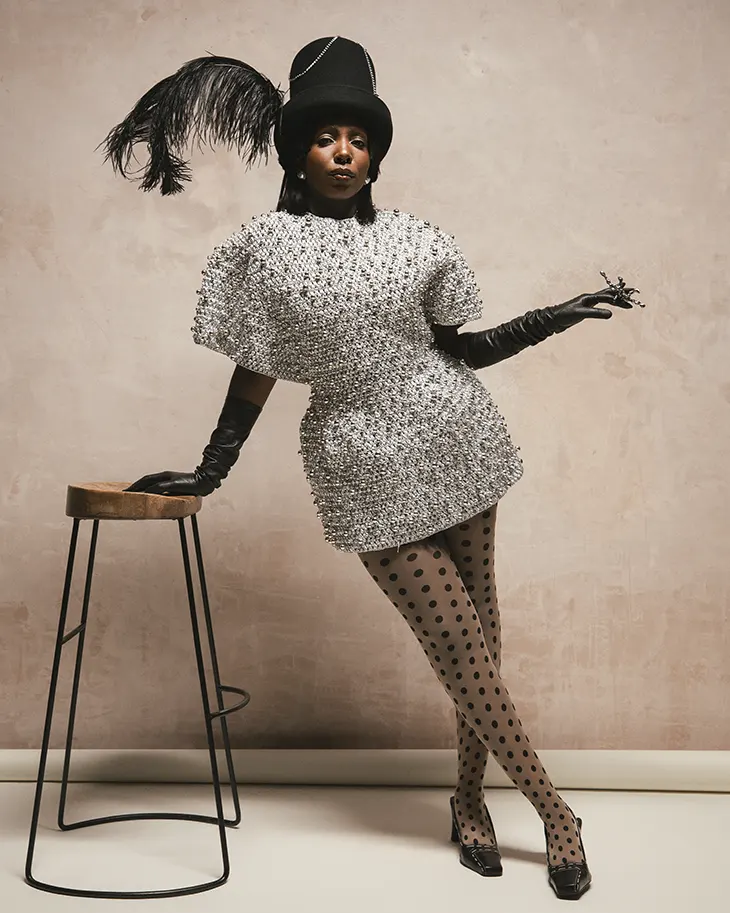
Tamara Lawrance has built a reputation for delivering grounded, impactful performances across film, television, and stage. This year, she steps into the lead role of Millie-Jean Black in HBO and Channel 4’s upcoming crime drama Get Millie Black. Written by Marlon James, the series follows Millie, an ex-Scotland Yard detective, as she returns to Kingston to work on missing persons cases, only to face a mystery that forces her to confront personal and societal challenges.
INTERVIEWS
With roles in notable projects such as The Silent Twins, The Long Song, and BBC’s Time, Tamara Lawrance has built a career marked by thought-provoking and layered storytelling. In this exclusive interview for DSCENE Magazine with editor Anastasija Pavic, Tamara opens up about her process of choosing roles, and how she navigates the complexities of the entertainment industry. She shares insights into embodying Millie-Jean’s layered personality, balancing the character’s detective instincts with personal vulnerabilities, and the emotional depth of her journey. Tamara also reflects on the influence of social issues in her work, the differences in preparing for stage and screen roles, and her aspirations for the next chapter of her career, including producing and writing.
Tamara, you’ve played such a diverse range of roles across stage and screen. How do you decide which projects resonate with you the most?
I’d say I’m generally quite feeling-led, so the projects that provoke a sensory reaction when I read them tend to be the ones I feel most passionate about pursing. I also get excited by variety and try to gravitate where possible to work that feels like it might offer something different to other roles I’ve played.
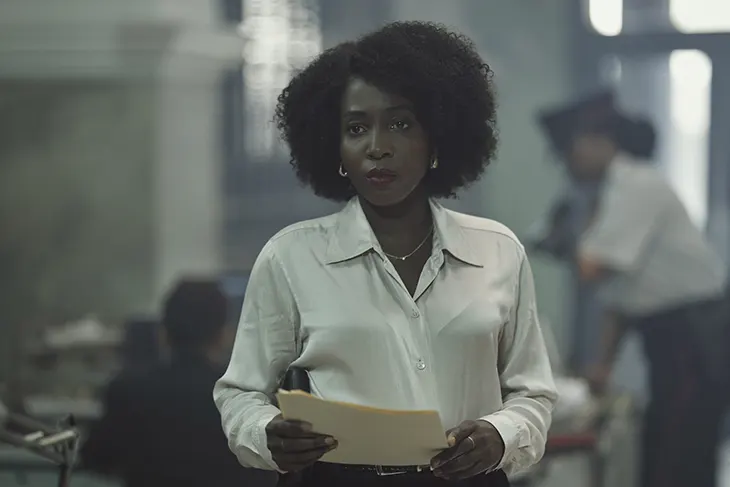
What drew you to the character of Millie-Jean Black in “Get Millie Black”?
She’s very confident and very layered, I loved that. Not confident in the trite way but confident as in, she trusts herself.
I was really drawn in by Millie’s irreverence; she’s abrupt and will verbally downsize anyone who she thinks is taking liberties! She has this relentless desire for justice – even as many people become collateral in her endeavours. She can seem selfish, but I think deep down she is loving and much braver than most. Her actions are actually quite profound, when you consider what she is willing to sacrifice.
I was also intrigued by the complexities of her interpersonal relationships… she presents as though she doesn’t need anyone but is deeply lonely and craves a sense of home. She won’t quite allow herself the full scope of her emotions but has this vulnerable side which we see manifest in her remorse over past cases, her inability to process what happens to Curtis, and her desire to be closer to Hibiscus. She often suppresses her subconscious fears by trying to control future outcomes, which I think indicates a shadow desire to change her past. She’s definitely haunted, but she’s also so unstoppable. A nuanced babe.
How did you balance Millie-Jean’s role as a detective with the personal stakes she faces, especially with her sister involved in the narrative?
For me, it was important to remember that both are fundamentally linked. Desire for restoration with Hibiscus, and Millie’s obsession with the missing persons case, are coming from the same wound. Finding a missing person is her subconscious way of trying to retrieve a lost sibling and absolve herself of the guilt of leaving her behind. With distancing herself from Curtis we see again that she struggles with the potential of losing another person she is close to. These unprocessed triggers then spiral out into reckless choices in her work –– that play out in quite extreme ways.
You’ve worked on many projects that touch on social issues. Do you feel a sense of responsibility in choosing roles that provoke thought?
Media’s ubiquity and the influence it has over the zeitgeist is something I think about quite frequently I can’t lie! Which for me creates not necessarily a sense of ‘responsibility’ but more a personal preference to do work with a story or message that I feel aligned with. I ask myself, what is this project actually trying to say? Why are they putting this show on the screen or stage and why now? If I get weird vibes about the answer, it’s usually a pass; I always tell myself not to take a job that I wouldn’t feel comfortable promoting on the other end. Being part of projects that are deliberate about what they have to say is definitely important to me, but more than anything I just enjoy working with intentional creatives, even if the project as a whole isn’t necessarily didactic.
Your career spans film, television, and theatre. How does your preparation for a stage role differ from preparing for a role on screen?
They’re not too dissimilar in that both approaches usually start with text work and research for me, but prep for theatre sometimes feels a bit more physical than screen, and sometimes more collaborative because of the nature of rehearsals being a fixture in theatre that they’re not always for film and TV. But it really depends on what the role requires!
“Media’s ubiquity and the influence it has over the zeitgeist is something I think about quite frequently I can’t lie! Which for me creates not necessarily a sense of ‘responsibility’ but more a personal preference to do work with a story or message that I feel aligned with.”
What do you enjoy most about working on independent films versus major studio productions?
Indies have felt a little more intimate in my experience, so I most enjoyed having more rehearsal time as well as space for a slightly more organic shooting approach on set. My favourite part of Get Millie Black was the huge scale of international cast and crew that I had the joy of working with over the 3 months in Kingston and 1 month in London. It was a long shoot but being on set with such amazingly talented and kind cast members really kept me going.
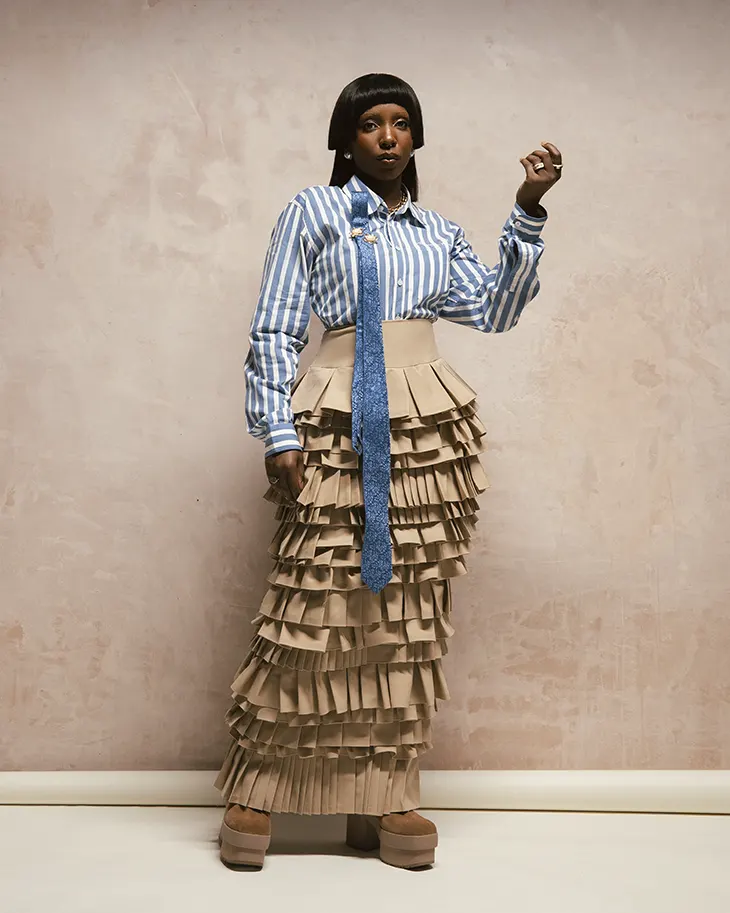
You’ve received numerous accolades, including BAFTA’s ‘Breakthrough Talent.’ How have these recognitions influenced your career and approach to acting?
More than anything, what I have come away with from some of these accolades are new connections with some great creatives.
Who has been your greatest source of inspiration throughout your career?
My family and my peers! My family have been supporting me since school plays… it feels surreal that I’m still at it but making them proud is definitely a propellor for me. I feel really inspired by this generation of contemporaries and am always moved by witnessing the evolution of my friends’ artistries. It’s a real privilege.
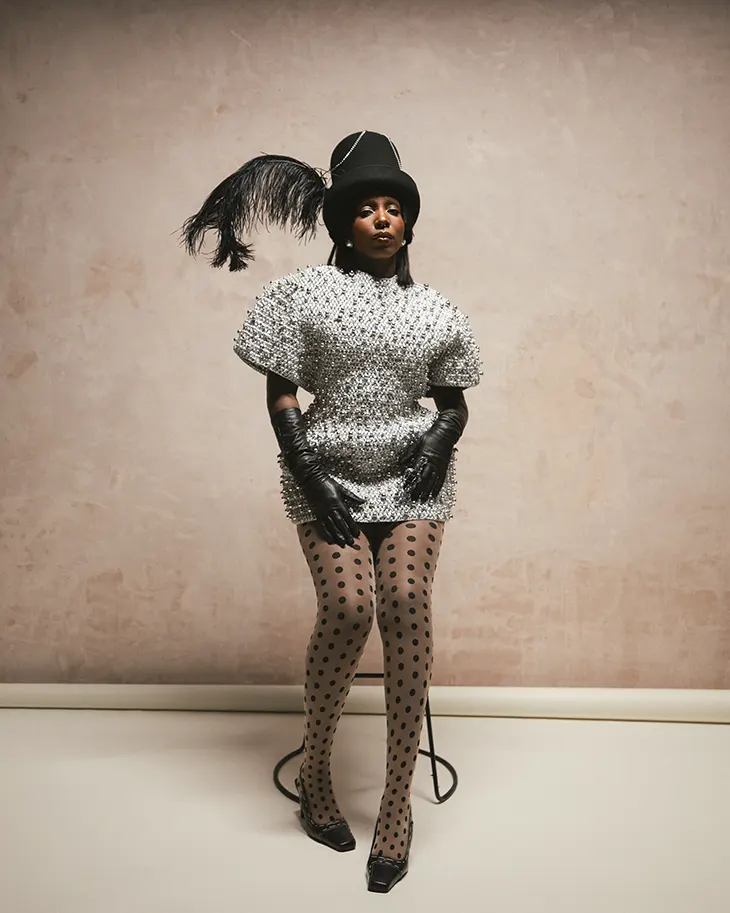
How do you handle moments of self-doubt or fear in such a competitive industry?
The two maxims that have kept me going over the years are “Everyone else’s career is none of your business” and “What’s for you won’t pass you by, what passes you by is not for you”. I was told both of these by older actors in my earlier twenties and they’re probably the best bits of advice I’ve ever been given. It really helped me to meet every rejection with grace and be happy for other people. To see people realise a dream is very powerful! It reminds me that the universe is in constant flux.
“Comparison is the thief of joy”, that’s another good one. In my teens I used to have that quote stuck on my wall with a bunch of others that motivated me. I think it’s important to just know yourself and stay inspired.
More recently, a mentor to a group of us “Love is the only force in the universe, fear is simply an illusion created by those who have forgotten”. Love is the only truth and everything else is fallacy. So, when I feel down badly, the practice these days is to be compassionate with myself as I figure out the real root of my self-doubt, and when I figure it out, to give myself even more gentleness. It’s not easy but I’m trying! We tend to be our most critical to ourselves when we’re feeling low but that’s when we need to be the kindest.
“My family have been supporting me since school plays… it feels surreal that I’m still at it but making them proud is definitely a propellor for me.”
In a few words, what would you say is the next chapter for you—both personally and professionally?
Balancing acting, producing and writing, hopefully! My friend and I are pitching a comedy right now and I also co-exec produced a short film recently called The Tobacconist, that has been doing well across the festival circuit. Really proud of both projects! So up next is just learning more of the ropes across those three disciplines, but more anon.
Personally – I’ll be taking good care of myself and getting out of London for long walks when I can to boost my serotonin, these grey skies won’t drag me down, I refuse!
